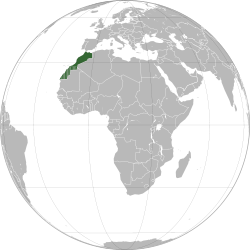By: Said Temsamani

Social, economic and political rearrangements are still unfolding in Morocco. A country without oil or gas and a large population of 33 million or more, Morocco is betting on the resourcefulness of its people and the stabilizing force of the centuries-old monarchy.
The term “monarchy” doesn’t resonate well in the United States because it connotes all the evils of ancient regimes. But in Morocco it is deeply entrenched in the country’s history. Sultans led the resistance against foreign occupiers and the king is now leading the way to modernization, despite all the pressures stemming from a bad global economy, the lack of resources, and the stubborn challenge of Islamism.
Morocco is then poised to provide real leadership to its citizens and the entire region. Post Arab Spring in the Maghreb has risen Islamist forces to the center of political life (apart from Algeria), while the consequences is different from country to country.
Liberal forces are present throughout and, while not in the majority and on the defensive, are not inconsequential. Berber ethnic- cultural identity has now been recognized officially in Morocco, and the revived Amazigh current in Libya has been vocal in demanding recognition.
Renewed unrest in Algeria is likely to include a Kabyle-Amazigh dimension, as it did a decade ago. As for Tunisia, the road to democracy is still very rocky. Western nations, especially Europe, have an enormous stake in the evolving political and social order of Maghreb states, but have not developed an overall economic and political strategy to guide its policies and advance their interests.
The United States has a stake in the Maghreb’s evolution as well, and is currently emphasizing the importance of continued democratization in a way that would ensure the protection of women and minority rights and the rule of law.
Through its constitutional reforms, Morocco has then set up a model in the region and thus has become a serious interlocutor to the west to promote those values of good governance, democracy and rule of law.
Economically, too, the U.S. is promoting a variety of development programs, but by themselves will hardly be sufficient. The U.S. appears to be supportive of the active role being taken by its Gulf Arab allies in the region, even if they themselves are hardly democratic. For the time being, however, their overriding common geopolitical interests, first and foremost vis-…-vis Iran, outweigh any differences that they might have regarding the value of democracy.
In any case, the GCC is a strong supporter of the Moroccan monarchy, as is the United States.. In Morocco, the monarchy possesses a special measure of legitimacy owing to its descent from the Prophet Muhammad.
The late King Hasan II sought to remake himself during the 1990s into a more benevolent ruler and promoted incremental change which included the involvement of traditionally opposition parties. His son, Muhammad VI, who has ruled since his father’s death in 1999, accelerated the pace of reform, bolstering his legitimacy among large sections of the public, even though Morocco’s underlying socio-economic problems remain acute.
However, King Mohammed has initiated a series of projects (the Green City in Benguerir, the Marchica Lagoon in Nador, and for sure more others are on his agenda). These projects aim to promote Moroccan economy, to create jobs , but most important is to give a concrete example to the whole region and that is : relying on the local expertise and the country proper funding, a lot can be achieved and certainly will attract more and more foreign investments.
Apparently Morocco has made the choice of continuing political reforms and at the same time pushing forward economic growth.
1
About the author:
Said Temsamani
Said Temsamani is a Moroccan political observer and consultant, who follows events in his country and across North Africa. He is a Senior Fellow, Merdian International Center Washington DC, Founder and CEO “Public Initiatives” Consulting firm and Former Senior Political Advisor, US Embassy Rabat, Morocco.
.






